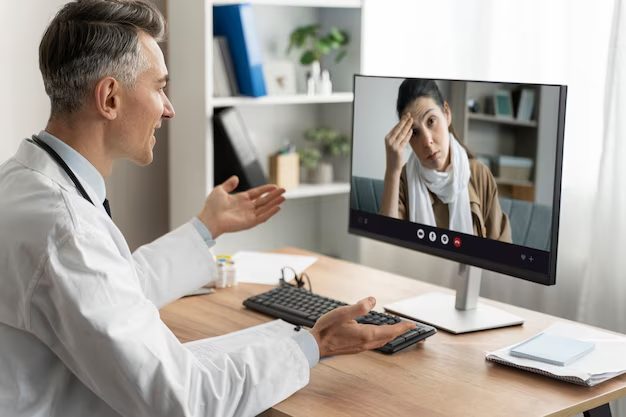Teleconsultation in healthcare refers to the use of digital communication tools to enable remote medical consultations, allowing patients to access expert healthcare without the need for physical visits. This modern approach has revolutionised healthcare delivery by improving accessibility, reducing waiting times, and enhancing patient convenience. A teleconsultation doctor provides a practical solution for those who may have difficulty visiting a doctor due to geographical constraints, mobility issues, or busy schedules.
Understanding Teleconsultation
What is Teleconsultation?
Teleconsultation is a form of virtual healthcare where patients connect with doctors through video calls, phone calls, or messaging platforms. This method allows for real-time consultations, diagnosis, and treatment planning without requiring a physical visit to a clinic or hospital. The convenience of teleconsultation makes it particularly valuable for managing chronic conditions, seeking medical advice for minor ailments, and obtaining prescriptions.
Feel free to read also – ไวรัสตับอักเสบซี อาการ
A Brief History of Teleconsultation

Teleconsultation has evolved significantly over the decades. It originated in the 1960s when early telemedicine experiments were conducted using telephone and radio communication to provide medical assistance in remote locations. With advancements in digital technology and internet connectivity, telehealth services have become more sophisticated, integrating secure video conferencing, electronic medical records, and AI-driven diagnostic tools.
Types of Teleconsultation Services
Teleconsultation services can be classified into several categories, including:
- Video Consultations – Real-time video interactions between doctors and patients for medical assessments and prescriptions.
- Phone Consultations – Audio-based medical discussions for quick advice and follow-ups.
- Asynchronous Messaging – Patients send text-based queries and receive responses from healthcare professionals at a later time.
- Remote Patient Monitoring – Devices track vital signs and send real-time health data to doctors for analysis.
- Specialised Mental Health Support – Virtual therapy and counselling sessions conducted by psychologists and psychiatrists.
Advantages of Teleconsultation
Convenience and Accessibility
Teleconsultation allows patients to receive healthcare from the comfort of their homes, eliminating the need for travel and long waiting times. This accessibility is especially beneficial for individuals in rural or underserved areas who may struggle to reach healthcare facilities.
Time Savings and Efficiency
By reducing the need for in-person visits, teleconsultation helps streamline the healthcare process. Patients can book an appointment online, consult a doctor within minutes, and receive electronic prescriptions or medical advice without unnecessary delays.
Improved Access to Specialists
Through teleconsultation platforms, patients can connect with specialists who may not be available locally. This increased access ensures that individuals receive the best possible care from experts in various medical fields.
How Teleconsultation Works
General Process
- Booking an Appointment – Patients select an available doctor and schedule a virtual consultation.
- Connecting with a Doctor – The consultation is conducted via video, phone, or text messaging.
- Diagnosis and Treatment Plan – The doctor provides medical advice, prescribes medications if necessary, and suggests further tests or referrals.
- Follow-Up Care – Patients may receive a follow-up consultation to monitor their progress.
Top Teleconsultation Doctor Services
Teleconsultation services are becoming increasingly popular, with many platforms offering virtual healthcare solutions. Leading providers offer features such as 24/7 access to doctors, secure prescription services, and integration with health insurance plans.
How to Choose the Right Teleconsultation Service
When choosing the right teleconsultation service, several key factors should be considered to ensure a seamless and secure experience. Cost and insurance coverage play a crucial role, as affordability and compatibility with your health insurance can impact long-term accessibility. Privacy and security are equally important, so selecting a platform that adheres to strict data protection and confidentiality regulations ensures that your medical information remains secure. Ease of use is another vital factor, as a user-friendly interface and reliable customer support can make the consultation process smooth and hassle-free. Additionally, if you require specialist care, it is essential to verify that the platform provides access to qualified experts in the relevant medical fields. Taking these factors into account will help you select a teleconsultation service that meets your healthcare needs effectively.
Importance of Researching User Reviews
Before selecting a teleconsultation service, it is advisable to read reviews from other users. Feedback from patients can provide insights into the quality of service, response times, and doctor expertise.
Tips for a Successful Teleconsultation
For a successful teleconsultation, ensure your internet connection is stable to avoid disruptions during the appointment. Choose a quiet, well-lit space to enhance communication and allow the doctor to observe any physical symptoms clearly if necessary. Prepare a list of symptoms, medical history, and any questions you may have to make the consultation efficient and thorough. Taking notes during the session can help you remember the doctor’s advice, prescribed medications, and any follow-up instructions, ensuring you can refer back to important details later.
The Future of Teleconsultation
Advancements in Telemedicine
With ongoing technological advancements, teleconsultation is expected to become even more integrated into mainstream healthcare. Artificial intelligence (AI), wearable health monitors, and electronic prescriptions are enhancing the efficiency of virtual healthcare.
Expansion of Telehealth Services
Telehealth services are expanding into new medical fields, including physiotherapy, dermatology, and chronic disease management. As governments and healthcare providers continue to invest in digital health, teleconsultation will likely become a standard option for medical care worldwide.
Conclusion
Teleconsultation has emerged as a powerful tool in modern healthcare, providing patients with convenient, efficient, and accessible medical services. By eliminating geographical barriers and reducing the strain on traditional healthcare facilities, telemedicine is shaping the future of medical consultations. While teleconsultation is not a complete replacement for in-person care, it serves as a valuable complement, especially for minor ailments, follow-ups, and specialist consultations. As technology continues to evolve, the scope and effectiveness of virtual healthcare will only expand, offering patients greater control over their health and well-being. Choosing the right teleconsultation service ensures a seamless experience, making expert medical advice more accessible than ever before.
